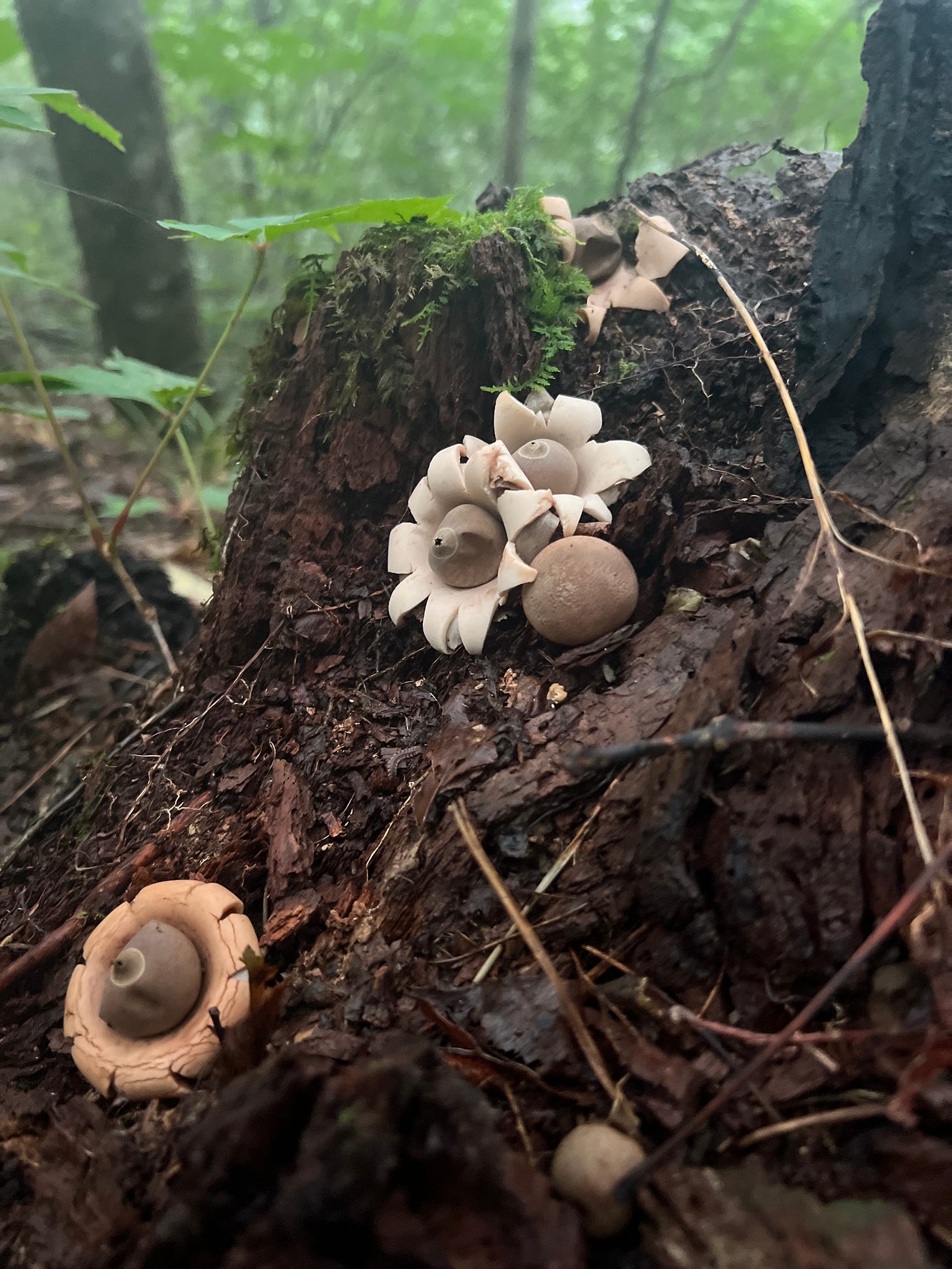The other day I set my alarm for 5 am to meet a friend at a locally famous overlook to see the sunrise. I drove for 35 minutes—down the sketchiest road and past a spooky cemetery—to arrive at a parking space in dark, isolated woods. I prayed for a gorgeous sunrise and a cloud inversion. When my friend arrived, she and I walked down to Snooper’s Rock, which is known for breathtaking views like below.
We got there when it was dark and the fog was thick. We settled into a spot with a fantastic vantage point as other sunrise peepers started to trickle in.
After 15 minutes, it looked like this:
The other spectators—including a couple who was getting married, complete with a photographer, officiant, and wedding party—all suggested the sun would probably break through soon. It usually does. Alas, after fifty minutes of waiting, it looked like this:
But then! Don’t worry, because we kept waiting. The sun doesn’t just not come up, right? After almost an hour and a half of watching and waiting, we were finally rewarded with this!
That’s some spectacular Before and After, huh? That, my friends, is what we would call a disappointment…especially for the couple trying to do a destination elopement 😬
Disappointment gets much more deep and painful than a nothingburger sunrise, of course. As you’re reading this, you’re probably carrying some big disappointments. I most certainly am. Let’s talk about it.
We don’t want to admit disappointment—or at least I don’t—because people might think you were a little foolish. Maybe you made a wrong decision or could’ve done something differently, and you’re just reaping what you sowed, right? I disagree.
I think being disappointed means you were brave enough to trust in something outside your control. To be disappointed means you hoped for something, right? It’s childlike. To hope is to take an emotional risk. It’s kind of scary to let your heart be vulnerable enough to hope.
The Most Disappointed People in the World
In June, I went to a house show led by a fascinating artist.1 This guy writes laments like no other. Many of his songs will most likely not cheer you up when you’re feeling down, but instead they’ll dig deeper into your doubts and questions. Mid-concert, he asked the thirty-five of us in the basement-venue if we had any questions about anything at all.
Someone asked, “Why do you keep praying?” and he was so brutally honest. He said that he identifies as Pentecostal—which threw me for a loop because I held a judgmental view of people from that background—and he said (with perfect comedic candor) that “Pentecostals are the most disappointed people on the planet.” They pray for everything, and most of it never happens.
He contrasted this by name-dropping a stuffy, conservative theologian and said, “I’ll bet that guy sleeps like a baby, because he never asks God for anything!”
So are we supposed to constantly set ourselves up for disappointment or are we supposed to never expect anything miraculous to happen? The poet pointed out this is the wrong question: The best part about praying is that you get to talk to God. If there really is a God of the galaxies with infinite wisdom and power, getting to actually be called His friend is a more powerful and satisfying turn of events than if everything you ask for ends up happening.
That doesn’t mean you won’t have some big questions when you know you’re asking for a good thing and He doesn’t seem kind enough or powerful enough to do it. I’m curious what you think about it. I think it’s very good to wrestle. I mentally and emotionally dip into atheism for a minute sometimes because I have big questions and, in the moment, highly doubt that an invisible God, an ancient book, or several millennia of potentially deluded followers would have any of the answers.
If Only Life Was a Machine
I wish life was more like a machine where you can put in effort and you’ll hear a whirr and a boop and then, ding, out will pop your desired outcome.
Prosperity preachers and self-growth gurus make you think that works. Whether they’re televangelists telling you “plant seeds of faith by sending money to our ministry and you’ll get health, wealth, and happiness” or beefy podcasters telling you “design your life, hustle, and you’ll have total freedom and only work four hours a week,” they’re profiting off of selling you hope.
Life isn’t like a machine, though, especially when your endeavors involve those complex and mysterious creatures called people. Life is more like a garden; you do need to plant seeds and tend to them and pull out weeds and plan and work. But sometimes there’s a drought or blight or invasive species. And yet there’s also this: sometimes you get to harvest things you didn’t plant, like when a pile of deer poo turns into a blackberry bush or when birds carry seeds on the wind or when mosquitos—yes, mosquitos!—pollinate flowers for you.
If life did work like a formula-following machine, then there would be no such thing as hope—because who hopes for what he can see?—and there would also be no such thing as grace. Grace is getting a pleasant outcome that you didn’t earn. Since life isn’t like a machine, sometimes we get incredible outcomes that we didn’t put in the work for.
Closing Thoughts on Disappointment
As I write, there are some chronically disappointing things I’m dealing with. (Part of it’s my fault; part of it isn’t…as with most things.) So here are some things I’m keeping in mind that might help you too:
It’s not healthy to be consistently disappointed. If I’ve been stuck for years in constant cycles of hope and heartbreak, I probably need to pivot. My heart is too precious to throw it before pigs2, and there are other places where I can direct my heart’s attention that are more likely to produce fruit. If I’m planting seeds and watering and nothing has happened in a long time, maybe it’s just bad soil and I should move on.3
Good friends make disappointments not so bad. If you’re heartbroken but you have a trustworthy person by your side, you are much more likely to feel like you’re going to be okay. Friends really help. (I actually still had a fun and meaningful morning with my friend at that lame sunrise.)
I want to always be stupid enough to hope. Imagine playing life so safe that you never get to enjoy the satisfaction of getting what you were hoping for. The risk of disappointment is worth it, much of the time. I’ve seen people walk through both disappointment and satisfaction as they were brave enough to try pregnancy, adoption, entrepreneurship, marriage, cancer treatment, etc. I admire people who try.
Prayer isn’t about getting control but about getting God. Talking to my Father and giving my burdens to Him—hard-to-prove deity, confusing old Book, and all—is a very, very happy thing. It’s incredible how much agency a hurting person can feel they have when they know the ear of Jesus is bent towards them and that the most important things in their life can never ever be taken away. I think that the God of the Bible is more of the God my heart wants than a god that my mind can keep up with.4
And you know what, dear reader? I’m definitely going to visit Snooper’s Rock at sunrise again. I’m already itching to go back.
May you and I be brave enough to be vulnerably hopeful about things in other areas of life, too.
Love,
Hope (ironic name for today’s topic 🤪)
I declined to name the artist here because I shared something he said in a semi-private setting.
see Matthew 7:6, a revolutionary verse for me this week
Romans 5:5 says “This hope will not disappoint us, because God’s love has been poured out in our hearts through the Holy Spirit who was given to us.” Yasss! And I haven’t even had time to mention hope about the far-far-far future, but I’ve shared quite a bit about heaven here, here, here, and here. The object of your hope is the most important thing, but even the person you know with the strongest faith will be disappointed and confused sometimes.










This did my hopeful heart so well. Thank you for sharing, Hope 💛